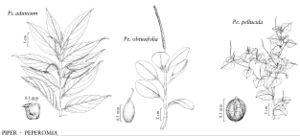Difference between revisions of "Piperaceae"
FNA>Volume Importer |
FNA>Volume Importer |
(No difference)
| |
Revision as of 22:12, 16 December 2019
Small trees, shrubs, or perennial or annual herbs, often rhizomatous, sometimes aromatic, glabrous, pubescent, or glandular-dotted, terrestrial or epiphytic. Stems simple or branched; vascular bundles in more than 1 ring or scattered. Leaves basal and/or cauline, alternate, opposite, or whorled, simple; stipules present, adnate to petiole; petioles usually present. Leaf blade: margins entire. Inflorescences terminal, opposite leaves, or axillary, spikes. Flowers bisexual; perianth absent, each flower subtended by peltate bract; stamens 2-6, hypogynous, anthers 2-locular; pistil 1, 1- or 3-4-carpellate; ovary 1-locular, superior; placentation basal; ovule 1; stigmas usually 3-4. Fruits drupelike. Seed 1; endosperm scanty; perisperm abundant; embryo minute.
Distribution
Primarily tropical and subtropical regions worldwide.
Discussion
Genera 15, species 2000 (2 genera, 9 species in the flora).
Lepianthes peltata (Linnaeus) Rafinesque, a soft-wooded shrub to ca. 2 m, included by some authors in Piper or Pothomorphe, has been collected as "growing wild" in Dade County, Florida (A. Herndon, pers. comm.). Lepianthes differs from Piper by its erect habit, by having axillary inflorescences, and by the spikes arranged in umbels.
This family should receive careful taxonomic and nomenclatural study.
